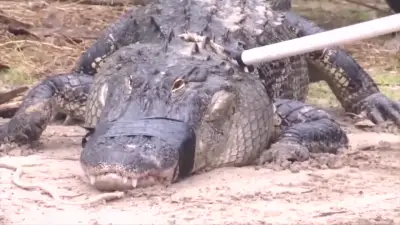Researchers at University of Florida suggest humans are primarily responsible for alligator attacks

GAINESVILLE Fla WSVN New research from the University of Florida as well as Centre College in Kentucky into alligator attacks suggests the animals aren t usually the instigators and that alligator attacks are at least percent avoidable The greater part alligator attacks are caused by people engaging in risky behavior as opposed to the animals acting overly aggressive A groundbreaking research takes a bite out of the dangers of gators showing that their bites aren t random but that a few form of human risk-taking took place before approximately percent of recorded incidents between gators and people The band searched through nearly three centuries of records on human-alligator interactions then augmented the information with internet searches and literature reviews as well as speaking with wildlife agencies They unveiled the majority bites occurred following moderate-risk behaviors such as swimming or going into areas known to have gators The overall main cause is people entering alligator habitat which is happening more and more as there are both more alligators and more people and as we re building and encroaching into alligator habitat encounters have just become more frequent revealed University of Florida Wildlife Ecology Professor and Author Frank Mazzotti Bites that are utterly unprovoked are very rare While particular happen without clear warning often people unknowingly trigger the gator s natural response to defend or hunt Professor Frank Mazzotti declared the results aren t surprising I don t think they were surprising to any alligator biologist or manager alligators are not voracious eating machines and they are not aggressive towards humans he commented Published in the journal Human-Wildlife Interactions the research is the first to develop a ranking system that categorizes human actions directly before an alligator encounter The insights are coming at a time when alligator activity is increasing Mating season which typically takes place from April to June brings more frequent movement and territorial behavior among the animals Researchers stress that humans entering the atmosphere of a large wild predator should assume specific level of responsibility and attentiveness Professor Mazzotti says curiosity plays a role in those enticed to get closer to the reptiles than they apparently should Appreciate the alligator from a distance you know don t approach it too closely If you notice the alligator starting to pay attention to you in any way move a little further away he stated Alligators are only interested in things within a certain distance from them Researchers recommend wildlife managers adopt diverse targeted communication strategies to promote safe behaviors around the animals stating increased awareness not only could reduce the number of bites but also the need to euthanize the reptiles after the attacks

